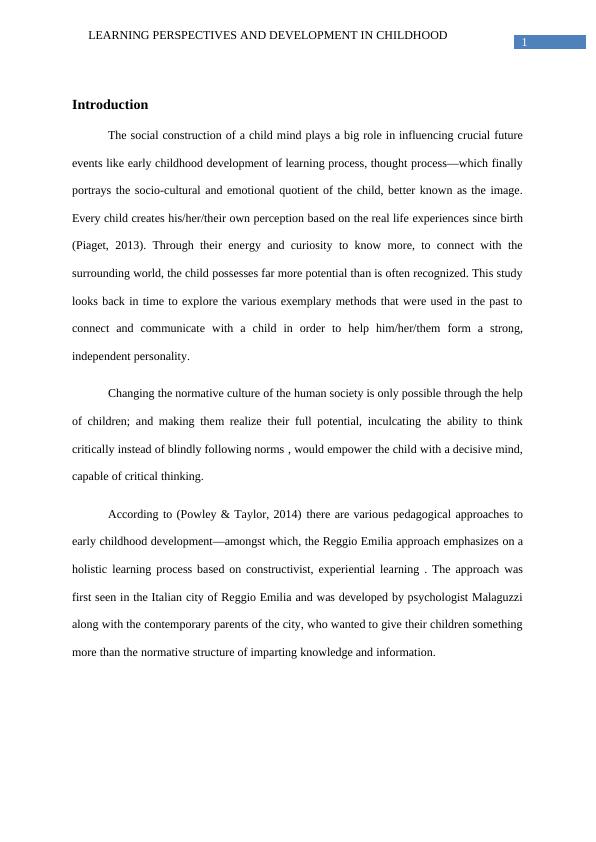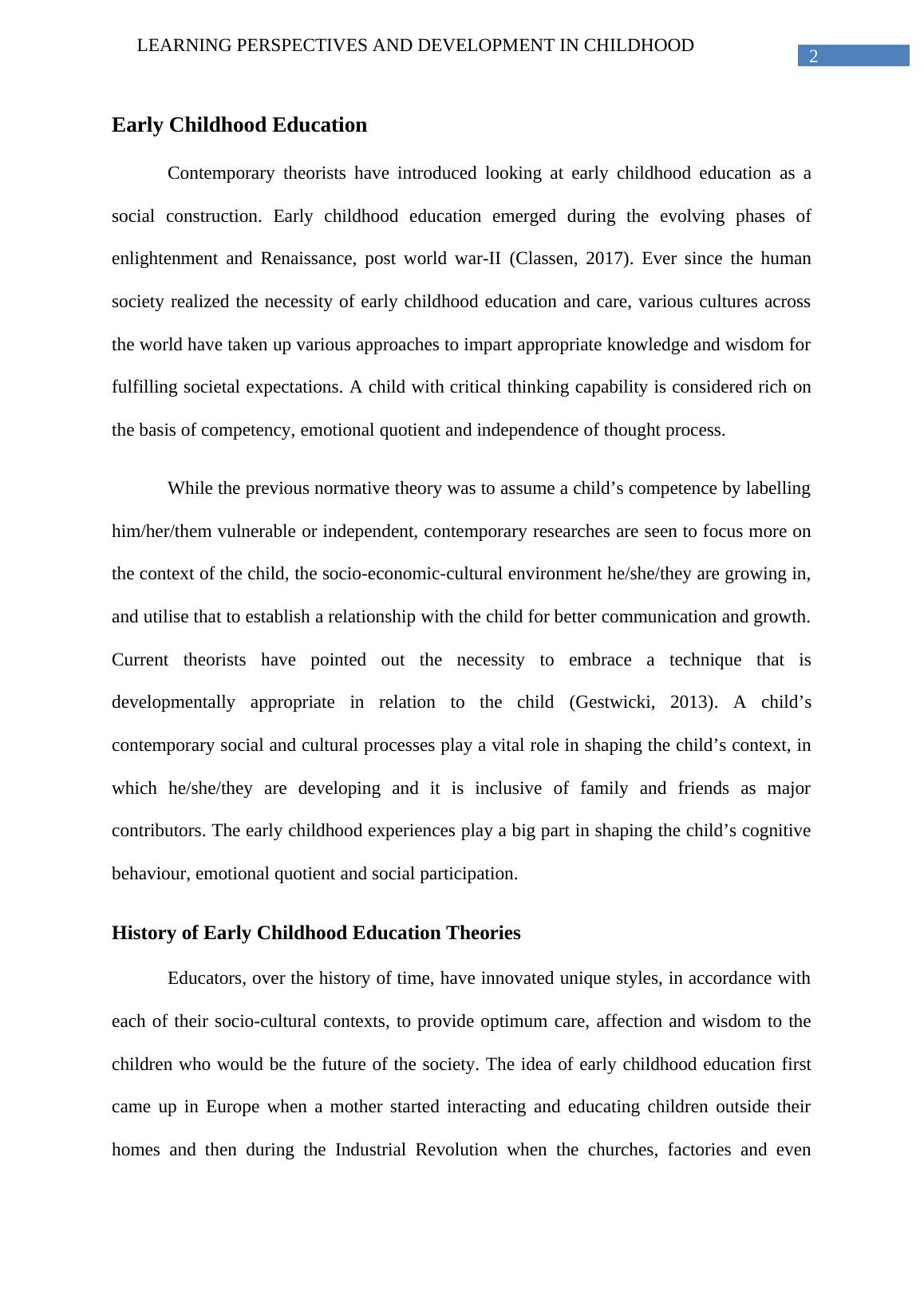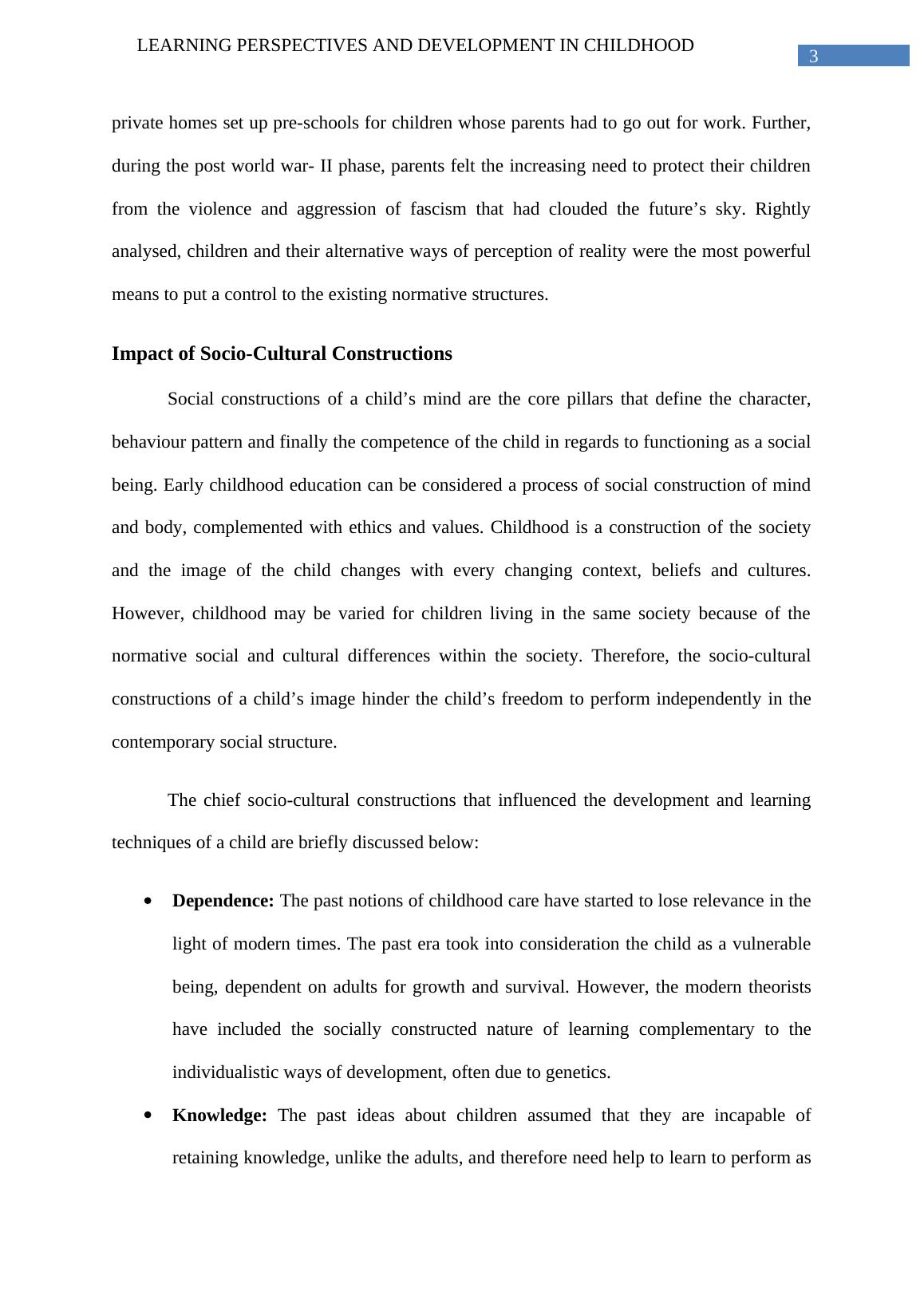(PDF) Developmental Perspectives on Learning
Added on 2021-04-21
11 Pages2942 Words102 Views
Running head: LEARNING PERSPECTIVES AND DEVELOPMENT IN CHILDHOODLEARNING PERSPECTIVES AND DEVELOPMENT IN CHILDHOODName of StudentName of UniversityAuthor Note

1LEARNING PERSPECTIVES AND DEVELOPMENT IN CHILDHOODIntroductionThe social construction of a child mind plays a big role in influencing crucial futureevents like early childhood development of learning process, thought process—which finallyportrays the socio-cultural and emotional quotient of the child, better known as the image.Every child creates his/her/their own perception based on the real life experiences since birth(Piaget, 2013). Through their energy and curiosity to know more, to connect with thesurrounding world, the child possesses far more potential than is often recognized. This studylooks back in time to explore the various exemplary methods that were used in the past toconnect and communicate with a child in order to help him/her/them form a strong,independent personality.Changing the normative culture of the human society is only possible through the helpof children; and making them realize their full potential, inculcating the ability to thinkcritically instead of blindly following norms, would empower the child with a decisive mind,capable of critical thinking.According to (Powley & Taylor, 2014) there are various pedagogical approaches toearly childhood development—amongst which, the Reggio Emilia approach emphasizes on aholistic learning process based on constructivist, experiential learning . The approach wasfirst seen in the Italian city of Reggio Emilia and was developed by psychologist Malaguzzialong with the contemporary parents of the city, who wanted to give their children somethingmore than the normative structure of imparting knowledge and information.

2LEARNING PERSPECTIVES AND DEVELOPMENT IN CHILDHOODEarly Childhood EducationContemporary theorists have introduced looking at early childhood education as asocial construction. Early childhood education emerged during the evolving phases ofenlightenment and Renaissance, post world war-II (Classen, 2017). Ever since the humansociety realized the necessity of early childhood education and care, various cultures acrossthe world have taken up various approaches to impart appropriate knowledge and wisdom forfulfilling societal expectations. A child with critical thinking capability is considered rich onthe basis of competency, emotional quotient and independence of thought process. While the previous normative theory was to assume a child’s competence by labellinghim/her/them vulnerable or independent, contemporary researches are seen to focus more onthe context of the child, the socio-economic-cultural environment he/she/they are growing in,and utilise that to establish a relationship with the child for better communication and growth.Current theorists have pointed out the necessity to embrace a technique that isdevelopmentally appropriate in relation to the child (Gestwicki, 2013). A child’scontemporary social and cultural processes play a vital role in shaping the child’s context, inwhich he/she/they are developing and it is inclusive of family and friends as majorcontributors. The early childhood experiences play a big part in shaping the child’s cognitivebehaviour, emotional quotient and social participation.History of Early Childhood Education TheoriesEducators, over the history of time, have innovated unique styles, in accordance witheach of their socio-cultural contexts, to provide optimum care, affection and wisdom to thechildren who would be the future of the society. The idea of early childhood education firstcame up in Europe when a mother started interacting and educating children outside theirhomes and then during the Industrial Revolution when the churches, factories and even

3LEARNING PERSPECTIVES AND DEVELOPMENT IN CHILDHOODprivate homes set up pre-schools for children whose parents had to go out for work. Further,during the post world war- II phase, parents felt the increasing need to protect their childrenfrom the violence and aggression of fascism that had clouded the future’s sky. Rightlyanalysed, children and their alternative ways of perception of reality were the most powerfulmeans to put a control to the existing normative structures.Impact of Socio-Cultural ConstructionsSocial constructions of a child’s mind are the core pillars that define the character,behaviour pattern and finally the competence of the child in regards to functioning as a socialbeing. Early childhood education can be considered a process of social construction of mindand body, complemented with ethics and values. Childhood is a construction of the societyand the image of the child changes with every changing context, beliefs and cultures.However, childhood may be varied for children living in the same society because of thenormative social and cultural differences within the society. Therefore, the socio-culturalconstructions of a child’s image hinder the child’s freedom to perform independently in thecontemporary social structure. The chief socio-cultural constructions that influenced the development and learningtechniques of a child are briefly discussed below:Dependence: The past notions of childhood care have started to lose relevance in thelight of modern times. The past era took into consideration the child as a vulnerablebeing, dependent on adults for growth and survival. However, the modern theoristshave included the socially constructed nature of learning complementary to theindividualistic ways of development, often due to genetics. Knowledge: The past ideas about children assumed that they are incapable ofretaining knowledge, unlike the adults, and therefore need help to learn to perform as

End of preview
Want to access all the pages? Upload your documents or become a member.
Related Documents
Assignment on Early Childhood Curriculum Developmentlg...
|7
|1300
|388
An Approach To Early Childhood Education Research Paper 2022lg...
|7
|1766
|20
Contemporary Perspectives of Learning and Development PDFlg...
|12
|3155
|43
Children's Learning Perspectiveslg...
|8
|2239
|91
Contemporary Perspective for Learning and Developmentlg...
|10
|2786
|481
Documentation: Educational Approaches in Australian State and Territorylg...
|12
|3311
|132
